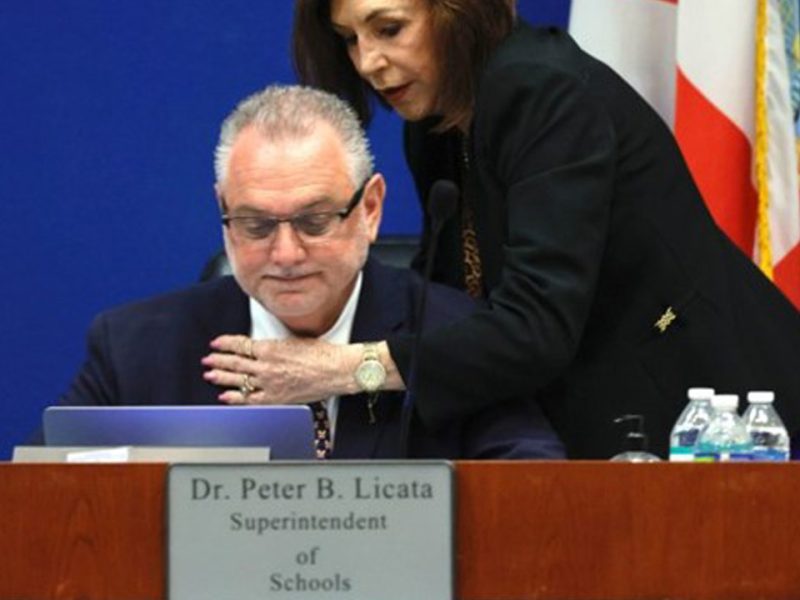Gov. DeSantis questions ‘intensive’ treatment for childhood obesity
Florida Phoenix | By Isaac Morgan | January 12, 2023
Gov. Ron DeSantis on Thursday made remarks about treatment options for children who are overweight or obese, saying pediatricians are “trying to monetize this issue” by using drugs and surgeries.
DeSantis also attacked the federal government for its quick approval for vaccines for young children during a press conference Thursday in The Villages, in central Florida.
DeSantis was joined by Florida Surgeon General Joseph Ladapo, where they discussed a state proposal to rein in so-called pharmacy benefit managers (PBMs) — middlemen that contract with insurers and pharmacies and can influence the country’s prescription drug system.
“We are gonna work with the Legislature, I’ve had productive conversations with many members there, that we are going to do the most comprehensive transparency legislation in Florida history, with respect to prescription drugs,” DeSantis said. “And that is going to affect not just the transparency but also the accountability and probably the most significant thing in this proposed legislation we are doing is reigning in these unchecked pharmacy benefit managers, PBMs.”
But the news conference diverted to the issue of childhood obesity, a serious problem in the United States, with nearly 14.7 million children and adolescents aged 2-19 years affected by it, according to the federal Centers for Disease Control and Prevention (CDC). (The American Academy of Pediatrics has used the figure of 14.4 million.)
The American Academy of Pediatrics released new guidance this week on treating children with obesity, advising a more intensive approach to treatment that could consist of medicine and surgery.

“It used to be where you look at drugs, you know, get a drug to deal with like, you know, cancer or Alzheimer’s and that would be great, even if it cost a lot,” DeSantis said. “If that is curing these things or mitigating it, that’s a great thing. But that is like okay, we want to help something important and so let’s put money behind it.”
“Now I think you have so much where they say ‘okay what can we make money off of first,’” DeSantis said. “Now they have this thing where they’re saying, ‘well these kids that are overweight should be given pump full of drugs and given surgeries for being overweight.’”
“That is just, to me, like I think that that’s them just trying to monetize this issue. Fact of the matter is kids years ago were more active than they are now, they had better diets than they have now, so why don’t we focus on those things whether than try to pump them with pharmaceuticals.”
In its guidance, the American Academy of Pediatrics argues that “there is more evidence than ever that obesity treatment in children is safe and effective,” while suggesting a variety of treatment options, including lifestyle treatment, medicine and surgery.
However, the guidance does include other approaches, such as better nutrition, physical activity and behavioral therapy. The comprehensive approach to treatment should include psychologists, nurses, exercise specialists, and social workers, according to the new guidelines.
For instance, the pediatric group recommends that a child with obesity receives “at least 26 hours of nutrition, physical activity, and behavior change lessons over 3 to 12 months” from a health care provider.
That should be accompanied by drug treatments, “metabolic and bariatric surgery if these treatments are indicated,” known as weight loss surgery. The group also suggests coaching on nutrition by a registered dietitian nutritionist and “role modeling” by their parents.
“There is no evidence that…delayed treatment is appropriate for children with obesity,” Sandra Hassink, an author of the new guidance and vice chair of the AAP’s Clinical Practice Guideline Subcommittee on Obesity, said in a written statement Monday.
“The goal is to help patients make changes in lifestyle, behaviors or environment in a way that is sustainable and involves families in decision-making at every step of the way.”
DeSantis also discussed the state’s pending effort by the federal government to import cheaper pharmaceuticals from Canada, claiming that the federal government cited concerns about drug safety.
He said the U.S. Food and Drug Administration “wasn’t as concerned and isn’t as concerned about safety when they are authorizing mRNA shots for six-month-old babies.”
“They didn’t have data to support that. And they did it, and they have authorized a lot of things that don’t have a lot of data,” DeSantis said.






